A Quote by Jorge Luis Borges
He was very religious; he believed that he had a secret pact with God which exempted him from doing good in exchange for prayers and piety.
Related Quotes
The thing that you have to understand about those of us in the Black Muslim movement was that all of us believed 100 percent in the divinity of Elijah Muhammad. We believed in him. We actually believed that God, in Detroit by the way, that God had taught him and all of that. I always believed that he believed in himself. And I was shocked when I found out that he himself didn't believe it.
When I was young I had an elderly friend who used often to ask me to stay with him in the country. He was a religious man and he read prayers to the assembled household every morning. But he had crossed out in pencil all the passages that praised God. He said that there was nothing so vulgar as to praise people to their faces and, himself a gentleman, he could not believe that God was so ungentlemanly as to like it.
It's true that to speak of an ethic of giftedness, which is very much the ethic that I deploy in raising questions about designer children and genetic engineering - an appreciation of the giftedness of the child or the giftedness of life does have religious resonance, because a great many religious traditions emphasize the sense in which the good things in life are not all our own doing; they are gifts from God.
But what will happen even if we do burn down the Jews synagogues and forbid them publicly to praise God, to pray, to teach, to utter God's name? They will still keep doing it in secret. If we know that they are doing this in secret, it is the same as if they were doing it publicly. for our knowledge of their secret doings and our toleration of them implies that they are not secret after all and thus our conscience is encumbered with it before God.
I just want to encourage every one of us to realize when we obey God, we’re not doing it for God—I mean, that’s one way to look at it—we’re doing it for ourselves, because God takes pleasure when we’re happy. That’s the thing that gives Him the greatest joy. So, I want you to know this morning: Just do good for your own self. Do good because God wants you to be happy. When you come to church, when you worship Him, you’re not doing it for God really. You’re doing it for yourself, because that’s what makes God happy. Amen?
On the ground of our own goodness we cannot expect to have our prayers answered. But Jesus is worthy, and for His sake we may have our prayers answered. There is nothing too choice, too costly, or too great for God to give Him. He is worthy. He is the spotless, holy Child, who under all circumstances acted according to the mind of God. And if we trust in Him, if we hide in Him, if we put Him forward and ourselves in the background, depend on Him and plead His name, we may expect to have our prayers answered.
Bold prayers honor God, and God honors bold prayers. God isn't offended by your biggest dreams or boldest prayers-he is offended by Anything Less. If your prayers aren't impossible to You, they are insulting to God- why? Because they don't require divine intervention. But ask God to part the Red Sea or make the sun stand still or float an iron axhead and God is moved to Omnipotent action
Jack believed in something—he believed in white witches and sleighs pulled by wolves, and in the world the trees obscured. He believed that there were better things in the woods. He believed in palaces of ice and hearts to match. Hazel had, too. Hazel had believed in woodsmen and magic shoes and swanskins and the easy magic of a compass. She had believed that because someone needing saving they were savable. She had believed in these things, but not anymore. And this is why she had to rescue Jack, even though he might not hear what she had to tell him.
Santa Claus is a god. He's no less a god than Ahura Mazda, or Odin, or Zeus. Think of the white beard, the chariot pulled through the air by a breed of animal which doesn't ordinarily fly, the prayers (requests for gifts) which are annually mailed to him and which so baffle the Post Office, the specially-garbed priests in all the department stories. And don't gods reflect their creators' society? The Greeks had a huntress goddess, and gods of agriculture and war and love. What else would we have but a god of giving, of merchandising, and of consumption?







































